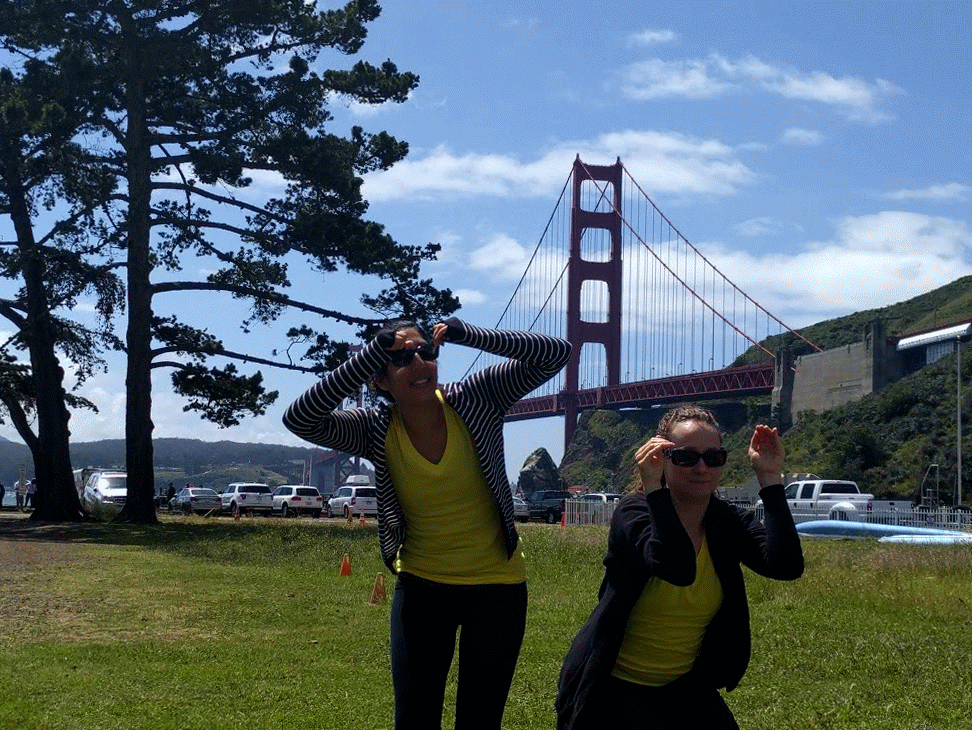This week on #MeetAScientist, get to know Shaila Kotadia, Director of Culture and Inclusion at Stanford University’s School of Medicine and a member of 500 Women Scientists’ advisory board. Shaila received her PhD in Genetics and Developmental Biology, and now works to eliminate barriers in STEM through building creative programs, mitigating bias, and changing policies and practices. In this interview, she chats about her work in the equity and inclusion space, as well as a little bit of her #SciMomJourney.
Main photograph taken by Justin Crest. The other person in the photo is Amanda Whitehead, Shaila’s former partner for STEM Dance-ology.
When did you first identify as a scientist? Where did your research interests center over the course of your training?
I struggle with my scientific identity. Reflecting back, I likely first thought of myself as a scientist when I was fortunate to have the opportunity to conduct undergrad research, however, that was definitely a naive understanding. The further along my scientific career path, I started to identify less as the "typical" values often praised in science misaligned with my own values and the values that align better with all of my other identities. Having said that, my research career focused on the cell cycle and cell division. There was always a beautiful quality to watching cells divide live with sophisticated imaging techniques.
Today, you work on addressing STEM equity and inclusion in academia, and share that expertise as an advisory board member for 500 Women Scientists. What are some common challenges you see and what advice do you have for addressing them at the individual level?
The biggest challenge is that academia is built on a system of oppression. Thus, trying to change on an individual level without understanding the history of societal, structural, and institutional oppression results in a disconnect. If an individual can recognize institutional oppression and then take time to understand how their individual and interpersonal behavior feeds into that system, perhaps we can work collectively to change the individual and the academic system.
Shaila and her son Remi at a birthday party. Photo by Shashi Kotadia.
This month, we're highlighting awesome scientist moms through our #SciMomJourney initiative. We talk a lot at 500 Women Scientists about how our identities and life experiences have enriched the work we do. So I'm wondering, how has being a scientist informed your experience as a parent, and vice versa?
Being a scientist taught me how to experiment and then reiterate in a critical and conscious manner. So, as a parent, I can continually try new ideas and refine the way I parent based on my experience. However, it's a lot harder with kids! As someone that works in equity and inclusion, it has taught me that I am responsible about teaching my kids about inequities that exist and how to treat people with respect and recognize the value of our differences. I am no longer in the lab but in my current workspace, being a parent teaches me patience.
When you're not working to build better and more inclusive institutions, how do you relax and unwind?
To relax and unwind, my number one activity is to take dance classes. I take modern and ballet classes. They offer me a form of expression, exercise, and most importantly, mindfulness and meditation.
Shaila Kotadia, Ph.D., is the Director of Culture and Inclusion for the School of Medicine where she focuses on the integration of diversity and inclusion activities across all constituencies from students through faculty and implements school-wide diversity and inclusion strategy and planning. Dr. Kotadia received her undergraduate degree in Cell and Structural Biology with minors in Geography and Chemistry from the University of Illinois, Urbana-Champaign followed by a Ph.D. in Genetics and Development from the University of Texas Southwestern Medical Center. Her postdoctoral work at the University of California, Santa Cruz focused on cell division and chromosome segregation. Prior to starting at Stanford, Dr. Kotadia led the STEM Equity & Inclusion Initiative at the University of California, Berkeley where she conducted an institutional assessment of STEM diversity programs and advanced partnerships in equity, inclusion, and diversity to ensure student and research success in STEM academic units.



